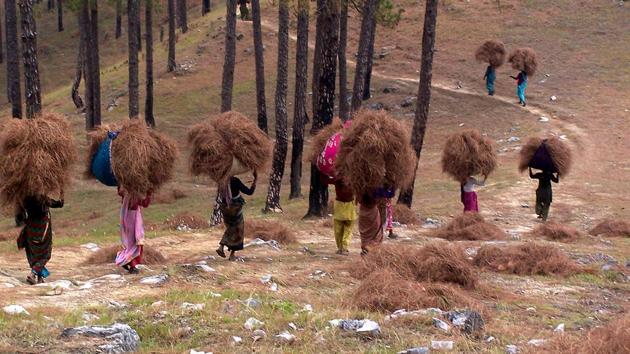Uttarakhand Cabinet approves plan to generate power from dry pine needles
The policy will pave the way for generation of 150 MW of electricity from dry pine leaves, besides setting up of briquetting and bio-oil plants
The Uttarakhand Cabinet on Thursday approved a policy, permitting commercial use of dry pine leaves, considered as the main factor behind forest fires in the state, for generating electricity. The move is likely to give a boost to the rural economy

“The policy will pave the way for generation of 150 MW of electricity from dry pine leaves, besides setting up of briquetting and bio-oil plants,” state urban development minister Madan Kaushik, who is also the state government’s spokesperson, said.
He was briefing newspersons about decisions taken during the meeting chaired by Chief Minister Trivendra Singh Rawat.
Apart from boosting alternative energy production in the state, it will also generate large scale employment opportunities at the local level, Kaushik said, adding that it will also reduce frequency of forest fires which cause great damage to wildlife and forest wealth.
“The locals would be given a preference in setting up plants with a capacity of generating one megawatt of electricity using pine needles.”
Under this policy, 10 and 25 KVA power generating units will be set up in Uttarakhand through state-based voluntary organisations, firms, industrial units co-operative societies and community-based organisations, the minister said.
Around six thousand such units can be established under the policy which can give direct and indirect employment to around 60,000 people and help stop migration of locals in search of work, Kaushik said.
A 25 KVA dry pine leave power generating unit comes up at an estimated cost of ₹25 lakh which includes grants from the state government under the MSME policy and the central government’s share.
The 25 KVA power plants based on dry pine leaves will generate 1.40 lakh units of electricity per annum and around 21,000 kg charcoal which will bring an income of ₹9.3 lakh when sold, he said.
“It is mandatory for the beneficiaries to submit projects for setting up such plants by the end of 2019,” Kaushik said adding the beneficiaries would be provided a subsidy of ₹18000 per person. Besides, those interested in setting up such plants will also be entitled to an additional 30% to 60% subsidy under the government’s Micro, Small and Medium Enterprises (MSME) policy.
Subsidies would also be provided to the people wanting to set up plants for producing bio oil or briquettes through pine needles. “Panels headed by district magistrates will shortlist applications submitted by people keen on setting up plants for producing electricity using pine needles”, said the minister. “The state government will purchase the electricity generated by such plants at the minimum support price of ₹5.36 per unit,” he added.
Kaushik said generating electricity using pine needles would give a boost to the hill state’s rural economy in the times to come. “Pine forests are spread over a four lakh hectares area of the mountain state, which comes to a 16.36% of the total forest area”, he clarified. About 15 lakh metric tonnes of pine leaves are generated in the state annually. “Some 40% of the raw material (pine leaves) is found appropriate for the industrial use”, Kaushik said.






